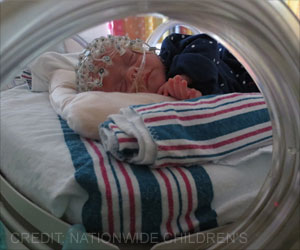Delayed clamping reduces hospital mortality by a third and is safe for mothers and pre-term infants, says study.

‘Simply clamping the umbilical cord 60 seconds after birth can save 11,000 to 100,000 additional lives every year.’





The review also reported that delayed clamping reduced subsequent blood transfusions and increased neonatal hematocrit, confirming that placental transfusion occurred. "The review shows for the first time that simply clamping the cord 60 seconds after birth improves survival," said the University of Sydney's Professor William Tarnow-Mordi, senior author.
"It confirms international guidelines recommending delayed clamping in all preterm babies who do not need immediate resuscitation."
"We estimate that for every thousand very preterm babies born more than ten weeks early, delayed clamping will save up to 100 additional lives compared with immediate clamping," said the University of Sydney's Associate Professor David Osborn, the review's lead author and a neonatal specialist at Royal Prince Alfred Hospital.
"This means that, worldwide, using delayed clamping instead of immediate clamping can be expected to save between 11,000 and 100,000 additional lives every year."
Advertisement
The Australian Placental Transfusion Study enrolled 1,566 babies born over ten weeks early in 25 hospitals in seven countries. The authors reported a 6.4 percent mortality rate in the delayed clamping group compared to 9 percent mortality rate in the immediate clamping group (p=0.03 in unadjusted analyses; p=0.39 after post-hoc adjustment for multiple secondary outcomes).
Advertisement
Co-author of the Australian Placental Transfusion Study, Professor Roger Soll of the University of Vermont College of Medicine, added "About 15 million babies are born before 37 weeks gestation annually and one million die. This procedure costs nothing and will make a difference to families worldwide."
Chancellor of the University of Sydney, Belinda Hutchinson AM said the research is a breakthrough for families like hers who have experienced the emotional and physical impact of preterm birth.
"This is a cause which is very important to me, with my own granddaughter born at 28 weeks. She is now a vibrant three year old but I know many others don't have such a great outcomes which is why research in this area is so vital."
Source-Eurekalert










